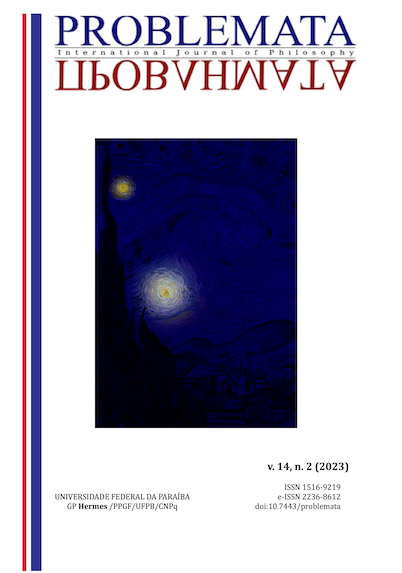REFLECTION ON THE NOTION OF INDIVIDUALITY IN MAX HORKHEIMER
DOI:
https://doi.org/10.7443/problemata.v14i2.66565Keywords:
Crisis of civilization, Enlightenment, Individuality, Instrumental reason, Max HorkheimerAbstract
This essay seeks to reflect on the emptied culture, which underlies the concept of contemporary individuality, analyzing it in the historical movement that makes it social adjustment or instrumental training for the maintenance of the developed industrial society. The analysis is based on the chapter "Rise and decline of the individual", from Max Horkheimer's Eclipse of Reason. In it, the Western civilizing process is thought by the Frankfurtian as a way to expose the limits of rationality that architected the project of enlightenment and gave rise to the civilizing crisis of the twentieth century. His analysis is based on the Critical Theory project, developed by the Institute for Social Research, through which the thinker elaborates his critique of Western culture. Therefore, this text approaches the concept of individual to register the cultural path of constitution of the enlightened identity of the self, by the enlightenment rationality, as well as the contradiction registered in the bourgeois rationality itself which subsidizes the positive idea of progress and executes the technical-scientific plan which brutalizes and dehumanizes the society. Therefore, Horkheimer's critique is not limited to the political facts that shook the planet, but to the amplitude of the civilizing process that regulated human actions in the world.
Downloads
References
AGOSTINHO, Santo. Confissões. Tradução do latim Lorenzo Mammì. São Paulo: Penguin Classics, Companhia das Letras, 2017.
AGOSTINHO, Santo. O Livre Arbítrio, Tradução: Nair de Assis Oliveira. São Paulo: Paulus, 1995. Disponível em: http://www2.uefs.br/filosofia-bv/pdfs/agostinho_03.pdf. Acesso em: 25 out. 2021.
AGOSTINHO, Santo. Sobre a potencialidade da alma, Tradução de Aloysio Jansen de Faria. Petrópolis: Vozes, 1997. Disponível em: https://docero.com.br/doc/80cc85. Acesso em: 25 out. 2021.
AQUINO, Tomás. O ente e a essência. S. Paulo: Nova Cultural, 2000a.
AQUINO, Tomás. Suma contra os gentios. S. Paulo: Nova Cultural, 2000b.
AQUINO, Tomás. Suma teológica. Vol. I. S. Paulo: Loyola, 2003.
ARISTÓTELES. Categorias. 2. ed. Tradução de Edson Bini. Edipro, 2020.
ARISTÓTELES. Metafísica. Tradução de Marcelo Perine. São Paulo: Loyola, 2001.
ARISTÓTELES. Política. Trad. Antônio Campelo Amaral e Carlos Gomes. Belo Horizonte: Vega, 1998.
GARRARD-BURNETT, Virginia. A vida abundante: a teologia da prosperidade na América-Latina. História: Questões & Debates. n. 55. Curitiba: Editora UFPR, 2011, p. 177-194.
HORKHEIMER, Max; ADORNO, Theodor W. Dialética do esclarecimento. Rio de Janeiro: Jorge Zahar, 1985.
JANUÁRIO, Adriano. Educação e resistência em Theodor W. Adorno. São Paulo: Loyola, 2020. p. 27.
PLATÃO. A defesa de Sócrates. São Paulo: Nova Cultural, 2000 (Coleção Os Pensadores).
PLATÃO. A república. Tradução Leonel Vallandro. 4. ed. Rio de Janeiro: Nova Fronteira, 2018.
HORKHEIMER, Max. Ascensão e declínio do indivíduo In: HORKHEIMER, Max. Eclipse da Razão. São Paulo: Centauro, 2000. p. 131-162.
SÊNECA. Da tranquilidade da alma. Porto Alegre, RS: L&PM, 2009.
TUCÍDIDES. História da Guerra do Peloponeso. Trad. do grego de Mário da Gama Kury. 4. ed. Brasília: Editora Universidade de Brasília, Instituto de Pesquisa de Relações Internacionais; São Paulo: Imprensa Oficial do Estado de São Paulo, 2001.
WEBER, Max. Ética Protestante e o Espírito do Capitalismo. 11. ed. São Paulo: Pioneira, 1996.
Downloads
Published
Issue
Section
License
Copyright (c) 2023 José Mateus Bido, Maria Terezinha Bellanda Galuch, Haira Lima Ribas

This work is licensed under a Creative Commons Attribution 4.0 International License.
Authors who publish with this journal agree to the following terms:
- Authors retain copyright and grant the journal right of first publication with the work simultaneously licensed under a Creative Commons Attribution License that allows others to share the work with an acknowledgement of the work's authorship and initial publication in this journal.
- Authors are able to enter into separate, additional contractual arrangements for the non-exclusive distribution of the journal's published version of the work (e.g., post it to an institutional repository or publish it in a book), with an acknowledgement of its initial publication in this journal.
-
- Authors are permitted and encouraged to post their work online (e.g., in institutional repositories or on their website) prior to and during the submission process, as it can lead to productive exchanges, as well as earlier and greater citation of published work (See The Effect of Open Access).





